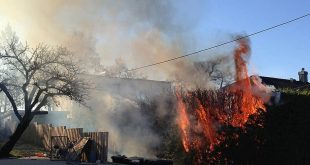The smart city is becoming an increasingly tangible reality for citizens in urban areas, with the efforts made to increase mobility and energy management being obvious examples. But is more efficient transport and optimized energy consumption sufficient to define a smart city? Being a member of the jury of the international Prizes Le Monde-Smart Cities that will be awarded in Singapor …
Read More »Search Results for: Supply chain
IMPETUS: towards improved urban safety and security
How can traffic and public transport be managed more effectively in a city, while controlling pollution, ensuring the safety of users and at the same time, taking into account ethical issues related to the use of data and mechanisms to ensure its protection? This is the challenge facing IMPETUS, a €9.3 million project receiving funding of €7.9 million from the …
Read More »Crisis management: better integration of citizens’ initiatives
Caroline Rizza, Télécom Paris – Institut Mines-Télécom As part of my research into the benefits of digital technologies in crisis management and in particular the digital skills of those involved in a crisis (whether institutions or grassroots citizens), I had the opportunity to shadow the Fire and Emergency Department of the Gard (SDIS) in Nîmes, from 9 to 23 April …
Read More »Koovea: an intelligent system for monitoring temperature-sensitive drugs
Koovea offers a service for monitoring temperature-sensitive drugs that ensures safe packaging conditions throughout the entire shipping process. The startup has just raised €60K through Créalia Occitanie. The interest-free loan will help the startup finance its R&D and strengthen its own capital before launching its product in June 2018. One out of every two drugs is temperature-sensitive. These fragile …
Read More »Bitcoin: the economic issues at stake
Patrick Waelbroeck, Institut Mines-Télécom (IMT) Cryptocurrencies like Bitcoin only have value if all the participants in the monetary system view it to as currency. It must therefore be rare, in the sense that it must not be easily copied (a problem equivalent to counterfeit banknotes for traditional currencies). This is a requirement that is met by the Bitcoin network, which …
Read More »Digital technology and energy: inseparable transitions
What if one transition was inextricably linked with another? Faced with environmental challenges, population growth and the emergence of new uses, a transformation is underway in the energy sector. Renewable resources are playing a larger role in the production of the energy mix, advances in housing have helped reduce heat loss and modes of transportation are changing their models to …
Read More »How the SEAS project is redefining the energy market
The current energy transition has brought with it new energy production and consumption modes. Coordinated by Engie, the european SEAS project aims to foster these changes to create a more responsible energy market. SEAS is seeking to invent the future of energy usage by facilitating the integration of new economic stakeholders to redistribute energy, as well as increasing the energy …
Read More »Agro-based composite materials – a Mines area of expertise
The materials of the future need to be more than just high-performance. They must also be environmentally friendly: more recyclable and based on renewable resources. This is why scientists and industrialists are taking a closer look at composite materials developed from plant fibers. They represent a major research focus for Institut Mines-Télécom (IMT) schools — especially at Mines Alès and …
Read More »Vabhyogaz uses our waste to produce hydrogen
Hydrogen is a resource that is prized for its applications in the chemical industry and for its role in the fuel cells used in electric vehicles. Vabhyogaz – a project initiated by Didier Grouset, a researcher at Mines Albi – proposes to convert biogas from our waste into hydrogen. The project, which began nearly ten years ago, is now entering …
Read More » I'MTech L'actualité scientifique et technologique de l'IMT
I'MTech L'actualité scientifique et technologique de l'IMT








